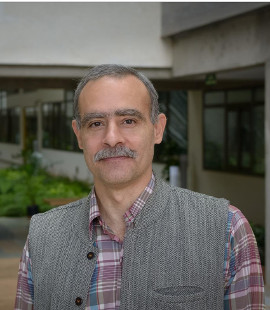Dean's Note : SUPPORTING OUR SCIENCE
OVERVIEW
As we close in on our 25th birthday (in October 2016), renewal is the keyword. All institutions must master the art of farewell as well as welcome, of sustaining traditions along with breaking new trails. In the past year we have had our share of each of these. Four new investigators have joined over the year, and we bade farewell to several others. Our strength at NCBS is now 32 groups, and counting, but we draw a greater strength still, from the many linkages we have forged both on the campus and further afield.
These linkages are the taproot of our renewal. While individual brilliance and a maniacal focus on personally engrossing questions remain the starting point for science, the scale of questions in Biology has ratcheted up to a magnitude that individuals, however gifted, cannot encompass. While it is still too early to speak of the flowering of cross-campus and cross-country research enterprises, many have been seeded and we can see their first shoots. Fittingly for this floral metaphor, the Chemical Ecology programme is one of these, bringing together plant-and-animal friendly groups on campus, nearby in the Agricultural Sciences University, and field stations and collaborators all over the country. Similar ties now link groups to our neighbours at inStem, to engineering colleges and medical institutions, and to researchers around the world.
A common denominator of this emphasis on outreach is that we need to amplify our science. We have come a long way through individual excellence, but there are broader, and changing horizons in today’s science. Engagement with larger research consortia, as indicated above is one way to do this. Beyond collaborations, we have long been fortunate to have outstanding researchers visit our campus. We have established a new programme where we request such visitors to spend an extra couple of days to talk to our scientists, challenge them, and point their sights higher. Many have gracefully agreed. This calibration against the best of the world is fundamental to our ongoing process of renewal.
At a practical level, this renewal and influx of new colleagues have meant that our research facilities and administration are confronted with many opportunities in the familiar disguise of much more work. They have responded energetically, while initiating many steps in their own renewal. The technical services have witnessed the handing over of the coordinator’s baton from Mr. P.C. Gautam to Mr. H.S. Venkataramana. Mr. Gautam oversaw an enormous growth in engineering responsibilities while doing an outstanding job of streamlining coordination between the units of the technical team. Our animal facility has taken a further step up with the joining of Dr. Aurelie Jorie to head the mouse Transgenics effort. Another major change has been working its way through the administrative services, with substantial changes in structure as well as leadership. We express an enormous appreciation for Mr. Pradip Pyne, who served for many years as the head of administration, and has now moved on to IIT Kharagpur. In his stead we welcome Mr. K.P Pandian, who has rich experience in the many government offices including as head of Finance at the Department of Biotechnology.
We also welcome Dr. Harleen Kaur and Dr. Rashi Tiwari to the Dean’s and Academic Office respectively, where they have brought a particular academically informed perspective and organization to these key offices. We thank Prof. Apurva Sarin, who has moved on to inStem as Dean, for a strong legacy of an efficiently running Academic office. We welcome Dr. Mukund Thattai, who now takes this over.
We are ultimately responsible to our broader civil society for the science we do, and outreach is an increasingly important aspect of our activities. This has manifested in numerous public events, ranging from flagship lectures, to cultural events, to school visits and lectures. We thank Dr. Soumya James for her stewardship of the Science and Society programme. This has passed to Dr. Aparna Banerjee, who comes in with a remarkable professional combination of research and dance, and has already set up a vigorous programme of artists in residence, speakers, and activities. The Research Development Office continues to provide a key interface with our funders, with academia, and, increasingly, with many forms of popular outreach including electronic media.
Dean of NCBS

Prof. UPINDER SINGH BHALLA


